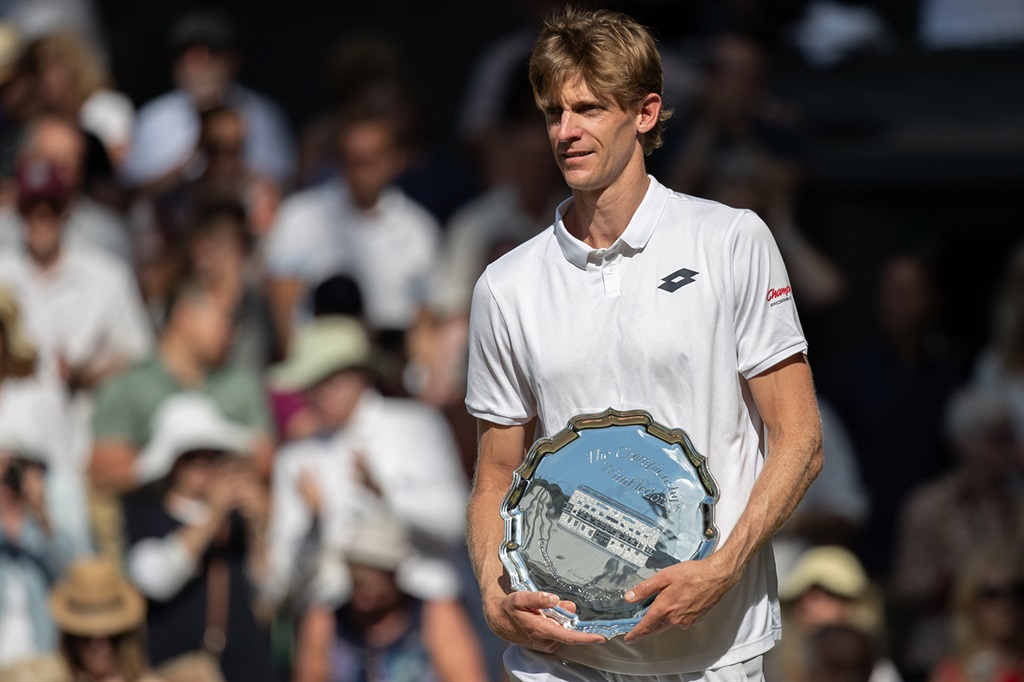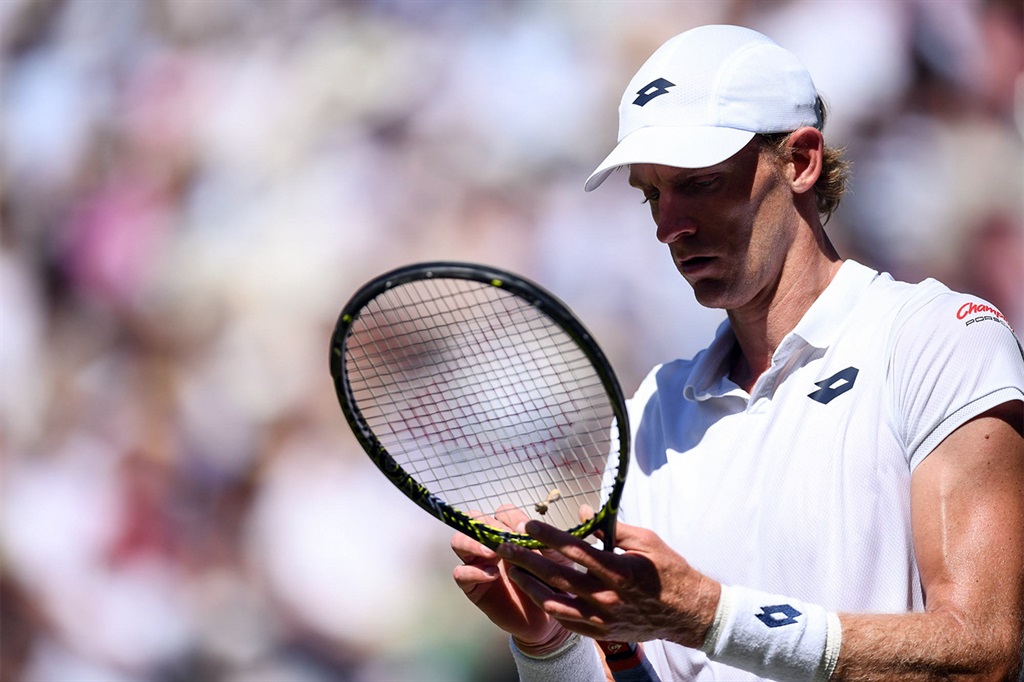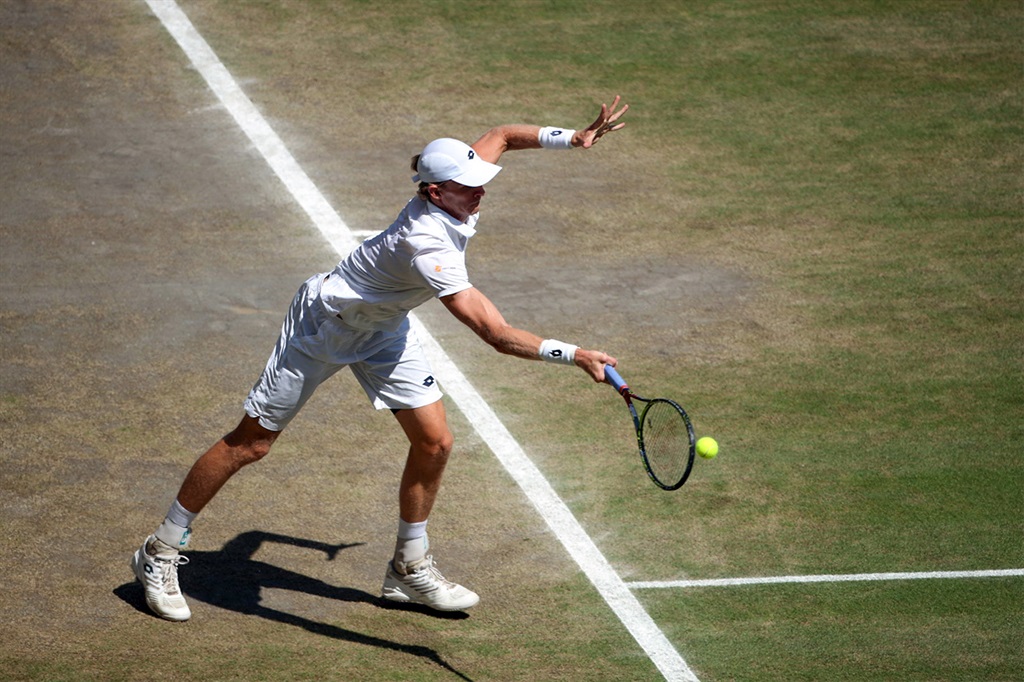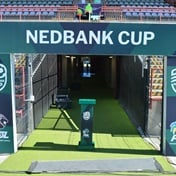
At the Wimbledon men’s final of 2018, tennis celebrated the return of a wonderful old friend. These last couple of years have featured an unfamiliar doppelganger bearing Novak Djokovic’s name, with none of his old invincibility; but as of the semifinals, the awkward stranger is banished.
It’s been a long, uncomfortable road, but the superstar is back, rocking the Centre Court, nibbling its grass in victory, and racking up the Grand Slams once again.
If this Championships decider fell short of an all-time classic, then the story it framed will go down in the history books nonetheless. Here was 32-year-old Kevin Anderson, the giant who no one saw coming, bidding to become the oldest first-time Wimbledon champion since the game turned professional 50 years ago, and the first South African to lift the famous gilt trophy. Opposite him was the 12-time Grand Slam champion Djokovic, who has endured two very long years of turmoil, injury and decline.
Each had fought breathtaking battles through earlier rounds to reach this shootout, but only one man could complete his personal odyssey with the ultimate prize – and it was Djokovic, delivering at times a near error-free display to capture his fourth Wimbledon crown 6-2, 6-2, 7-6(3).
Just months ago – weeks, even – such an idea was inconceivable. Yet having slumped to the world No. 21 spot, he has become the lowest-ranked man to win Wimbledon since Goran Ivanisevic did it as the world No.125 in 2001.
Djokovic came into this Fortnight on his humblest-ever seeding here, No.12, carrying the knowledge that this was the first season since 2006 that he has failed to win a Tour-level title before Wimbledon. But if a chap is going to capture his first tournament victory of 2018, he might as well make it the greatest prize of all.
All year Djokovic has shown increasing glimpses of the tennis which formerly made him the best player on the planet; but somehow the results he strung together – a semi-final in Rome, a quarter at Roland-Garros, the final and even a match point at Queen’s – served only to highlight the chasm between that form and the insuperability of old.
Yet he had set himself the towering task of somehow mapping a route back to the player he used to be, and having done so there was no other way to go about it other than step by brutal step.
How easy it is for those of us who have stood witness to announce now that Djokovic’s belief never flagged. That cheap summation surely does him a vast disservice, so evident was his frequent bewilderment at the loss of his former powers.
But still he kept going, and with that marvellous display against a superb Rafael Nadal in the semifinal here, he was reborn – the player he used to be and more, wiser for all that he has endured.
Anderson, for his part, could not rise to the occasion. Having famously beaten Roger Federer 13-11 in the final set of an epic quarterfinal, he backed it up with that magnificent megaduel to defeat John Isner, but the final was a test too far.
Ten years after he last defeated Djokovic, he was hobbled both mentally and physically by the incalculable demands of so many hours on court. It was only in the third set that he began to play as he would have wished.
Even in the first set his service arm was suffering with the cumulative effect of so many power deliveries in so short a timespan, and he received attention from the trainer. At a set and 2-5 down he at last commanded a break point, but under relentless fire from Djokovic the forehand which has served Anderson so well could not deliver.
Throughout it all, the South African chattered away to himself in encouragement, deploying all the newly learnt mental tricks which have helped him to two Grand Slam finals in the last year. He will leap up to No. 5 when the latest rankings are released after The Championships, and his achievements at Wimbledon 2018 will not be forgotten.
But as the Centre Court surface temperature touched 40 degrees, Djokovic was hot stuff on a hotter day. With the heavy cloak of doubt cast aside, unburdened at last, Djokovic ensured that the legendary lawn was left scorched by more than just the summer sun.
For two sets his serve delivered time after time, and Anderson could scarcely touch it. Only when the prize drew near did Djokovic misfire, and he repelled five set points. Up ahead, triumph waited patiently.
The Serb took a step towards it with a delicious forehand pass; and soon after that, victory’s kiss left him on his haunches, as if in prayer. Minutes later, the ancient trophy was in his hands again, a sight applauded by his three-year old son Stefan in the arms of his mother, Djokovic’s wife Jelena.
“It feels amazing – the first time in my life I have someone screaming ‘Daddy! Daddy!’,” smiled Djokovic.
“I’m very emotional with him being there, and my wife and whole team. I cherish this moment.
I would like to congratulate Kevin. I was quite lucky to get through. I’m very grateful to everyone who has been supporting me. The last couple of years haven’t been easy, facing for the first time a severe injury. I had many moments of doubt and didn’t know if I could come back. But there’s no better place in the world to make a comeback. I always dreamed of holding this trophy as a boy. This is a sacred place for tennis. It’s very special.”
And then he laughed, gazing in wonder at the trophy – and so much else – restored to him once more. Novak Djokovic is the champion again, at Wimbledon, the place which matters to him the most. Welcome back, friend. Seems like old times.
Pictures: Jed Leicester/Aeltc
Kevin Anderson chats about his energy, that gruelling road to the final, and the exhiliration of making it through to the finals of Wimbledon.
How tired were you when you started? How did you develop and find your energy to play so well in the third set where you had five set points?
Yeah, it was a tough start for me. You know, you always have high hopes. Going into the match, I was hoping to draw on some previous experiences, playing at the US Open in the finals, obviously playing Federer a couple days ago.
But, yeah, I didn’t really find my form the way I wanted to. Of course, my body didn’t feel great. I mean, I don’t think you’re going to expect it to feel great this deep into a tournament when you’ve played so much tennis.
But I was definitely quite nervous starting out the match. Didn’t play great tennis in the beginning. I tried my best to keep at it. Definitely felt much better in the third set. I thought I had quite a few opportunities to win that third set, especially a couple of the points where Novak hit a couple balls, I thought they were actually going out, managed to land right on the line.
I would have loved to have pushed it to another set, but it obviously wasn’t meant to be.
Did you sense in the third set that he was tightening up?
Yeah, I mean, potentially. I mean, I just know from my side I was playing much, much better in the third set. I think one of the biggest challenges, you know, tennis players face, what sort of separated the top guys who have done so well and guys further down, is maybe not necessarily just their raw abilities, but it’s their ability to play their best tennis in these sort of matches.
I wasn’t able to do that in the beginning. He was. I was able to do it more in the third set. That’s the kind of tennis I would need to have to play and the comfortability [sic] I’d need from the beginning. That’s something we’ve worked really hard on. I know I’m making progress. I can take a lot of confidence in that.
It was obviously disappointing, not the result I was hoping for today. But, I always try to look for the positives from it.
How was the recovery period between the semifinal and final? Did that play a factor in the start of the final?
Yeah, potentially. Honestly, Saturday was pretty tough. There was a lot of thoughts going through my mind of, Am I going to be ready to play another three-out-of-five-set match on Sunday against somebody like Novak.
Getting here to the courts, seeing the doctors, seeing the podiatrist for my feet. Having a very light hit, I probably only hit for 10 or 15 minutes. You go through certain exercises that I do. When things aren’t feeling the way they should, you always have a little bit of doubt.
I think, I mean, I barely slept on Friday night. Actually last night I was able to get in a pretty good night. Waking up today, I actually felt okay, insomuch that, you know, I don’t think the match was entirely just because I wasn’t feeling the freshest. It was a bit more of being able to play the kind of tennis I needed to at this stage.
In the third set, I was able to actually pick it up a little bit. Obviously would have loved to have gone to a fourth set. I don’t know how I would have felt as the match progressed. Novak is very tough to match physically.
I think all in all, my body actually handled it pretty well.
Could you run us through what exactly you do compared to what you thought you were going to do in the 40 hours between the semifinal and the final.
Yeah, I sort of had high hopes and expectations that going out there I was going to be a little bit more comfortable, a little bit more free. That wasn’t meant to be. The way the ball was coming off my racquet, sort of the quality of my footwork, my ball striking wasn’t where it needed to be to compete with somebody like Novak.
That’s tough. It’s tough being out there at that stage, knowing you’re not playing the kind of tennis you want to play. I think even when I played Federer going down two sets to love, I felt I found my form much quicker. Even though I lost the second set, I felt it was a really high-quality set. I was actually feeling pretty comfortable the way I was playing.
I was able to pick it up a lot in the third set. I felt I played really good tennis. Sort of as Novak alluded to in the interview, I don’t think he was just being nice. I definitely had more opportunities than he did. I didn’t face any breakpoints. I had five set points. A couple of them, the one I was almost starting to celebrate, it managed to land in.
The biggest takeaway for me is sort of the belief, hopefully next time right from the beginning I’ll be able to play, you know, better tennis.
We never know what the high watermark is of anyone’s career. It may be for you today. What gives you the confidence that the high watermark is higher than today somewhere in the future?
Yeah, I think the main thing is if I look at the improvements I’m making, I feel like it’s getting better. Chatting with my team, everybody has the same sense looking at the way I play. I think there’s some small improvements I can still continue to make that will make life easier for me.
I definitely believe I have the game to win these tournaments. If you asked a lot of players, you know, their dreams, it’s to win Grand Slams, win Masters Series. Some players are able to trick themselves to really believing that. Even though it was a huge goal of mine, if you asked me this time a year ago, I don’t think I could sit here and say I really believe that I can win a Grand Slam and a Masters Series and say it with the same self-belief and confidence that I can now.
Obviously, that’s by no means a sure thing whatsoever, but it’s a big starting point. It’s taken a long time to get to this point. I feel like I’m on a great path. I’m trusting the process a lot. I have to continue doing that.
If I’m not in another Grand Slam final, it’s because maybe I just got unlucky. You can’t control everything. What I can control, I’m doing my best at doing. I have a lot of belief I can put myself into another one of these matches, and hopefully have the result that I’m looking for.
Today’s result is a bit unfortunate. Because of the two weeks of incredible tennis that you did in Wimbledon, you’re going to be in top five when the new rankings come out. What does that mean to you? Two years ago you had a lot of injuries, struggles.
It really means a lot actually. It was about two and a half years ago, just in the team and in the chat, we had a chat on WhatsApp called top-five Kev. That was the goal. I got to top 10 that year. Things were looking good. Then obviously I had a major setback and injuries in 2016.
So seeing that I made top five, I’m incredibly proud of that achievement, especially if I look back where I was just 15 months ago, around 80. It’s really something I can be very proud of.
Even though today is not the result I was looking for, I think in the next few days, just seeing my new career-high ranking is going to mean a lot to me. I think looking back at some of the matches here I’ve played, especially my quarterfinal and semifinal match, I think it will really sort of set in what I’ve accomplished. I can be happy with that and use it for continued motivation moving forward.
How well do you feel Novak is playing in comparison to when he was winning Grand Slams regularly?
It’s obviously tough to say. It’s a different set of circumstances. I’m not surprised that he’s been able to come back. He obviously is such a high-quality player. I practiced with him earlier this year out in Indian Wells. Even just practicing with him before this tournament. Obviously playing him today, you can definitely see the improvements he’s made since coming back from injury.
Obviously I think his match yesterday with Nadal was, you know, a big exclamation point to him to his physicality. I think he struggled with his serve coming back after the elbow, but I felt when I’ve played him before, I didn’t really notice. The serve was there today, how quick he was hitting it.
I mean, if you look at the year he’s had before he was injured, it was one of the most dominating years of all time. If he can match that, it would be an amazing effort. I don’t think that’s a fair benchmark to set to anybody.
Obviously he’s just won a Grand Slam again, his 13th. I think guys at the top can expect to see him on the other side of the net quite frequently.
In the two days since your 50-game fifth set, there’s been a lot of discussion of the issue of final set tiebreakers. What do you expect will happen?
You know, I’m not sure. Hopefully there will be at least a dialogue. Obviously just with the setup of the tour, the slams are separate from the tour, so we don’t really have the same voice, I feel, on certain issues. US Open is doing a shot clock. We weren’t really consulted on that. We were sort of told what’s going on with that. I’m hearing a lot of rumors about 16 seeds next year. That’s also not something we’ve chatted about sort of on the council.
I mean, I just hope the slams can also at least look at it and have an open conversation about it. I think it’s at least a conversation worth having both just protecting players’ health when you have these very long matches. But, you know, I honestly don’t know where it exactly will go from that.
I guess my hope is just to have a conversation about it.
The third set, you said you were playing some good tennis. Watching from the sidelines, you were a lot more free. Do you feel like if the match would have started again at that point, it might have panned out differently, if you had come into the game playing that freely?
Obviously impossible to say. Without a doubt, I would have given myself a better chance. I mean, in the first two sets, just the rhythm of my serve didn’t feel great. Obviously when that’s not getting me any free points. It’s my biggest weapon as a tennis player. In the third set, I found my rhythm. That’s how I serve 95% of the time.
I’m definitely not going to say that if I had started like that it would have been a different result. But at least I would have given myself a much better chance. I think I would have been much more competitive of course in those first few sets. I still would have had to overcome a lot of emotional battles out there, still in sort of new territory. He’s been there many times before.
But at least have a chance. I mean, I would have needed to have started the way I was playing in the third set.
The fifth-set tiebreaker, do you feel Grand Slams are making the final product in those final matches a bit worse off if players are coming through, like you, playing 22 hours of tennis to get to the final?
Yeah, I mean, I guess the flipside would be, I think fans specifically really enjoy and find a huge value in seeing extended matches. I mean, it’s definitely a talking point. People remember sort of those matches. I’m sure my match with John will be spoken about just because of the uniqueness of the match, the length of the match.
But, I mean, most people I speak to I feel really find value if there was a fifth-set breaker like there is at the US Open. It’s really exciting. If a winner hasn’t been decided at 6-All in the fifth, I don’t think there’s a reason to continue playing. I don’t think there’s that much value in having to break serve and hold serve. I think a tiebreaker would be fine. That would be sort of my case or my reasoning.
If the Grand Slams really feel like they hear a lot of people really enjoy that, then that’s something we might have to just continue with the same format.
You mentioned nerves affected you a little bit. If you looked at the last two matches, it seems your mental strength got you through those and into the final. You never faltered once in those two five sets. What was different about today? The size of the occasion?
I mean, my match with Roger, same thing happened in the first set. It was the same thing that happened today. I was able to turn it around, though, much quicker in the second set. That’s what allowed me to win that match. Even though I came close to losing that, I still think I found my comfortability and my rhythm out on the court in that second set. Today it was only in the third set.
Potentially had I won that third set, continued that sort of play, I was going to be in for a shot. He would still be the favorite up two sets to love. I’m not sure I would have been able to withstand physically. At least I would have sort of asked a question from his side.
Even though those two previous matches against Federer, I sort of started off. Those are the challenges I’m working on, taking the court against a very small group of guys who you see playing a lot at this sort of level, sometimes it can be intimidating playing them. I believe I’ve been able to continually take strides, feel more comfortable out there.
Even though I got through those matches, it was still a theme, something I’m going to have to continue doing a better job with.
Back to the issue of the fifth-set tiebreakers for a moment. Is there pretty much a consensus amongst the players on the council? Do you send text messages about this? Is it pretty much when you have the council meetings?
Honestly, in terms of our topics we’ve spoken about on the council for the last few years, me being on it for a while now, we’ve had so many things to talk about. Fifth sets hasn’t been something we’ve spoken about at all. It’s always been on the radar.
The amount of times that it happens is very, you know, rare. It definitely happened this tournament a few times at a very big stage, late in the tournament. It naturally becomes more of a discussion point.
It was a big discussion point when John played Mahut however many years ago. What a ridiculous match that was, crazy match that was. I think if I asked most players, they wouldn’t be opposed to incorporating a fifth-set breaker. I’m sure there’s a few people that embrace the history, that you do play long sets. It is a unique point. I definitely agree with that.
But I think just as tennis continues to evolve and just sports in general, I think the incredibly long matches maybe has had its place and time.
Could a 12-12 breaker be a compromise?
Yeah, I just don’t see a difference. At 6-all in the fifth, you’ve been out there a number of hours. I don’t think you’re going to gain much getting to 12-12. I think even that would be a step in the right direction.




 Publications
Publications
 Partners
Partners













